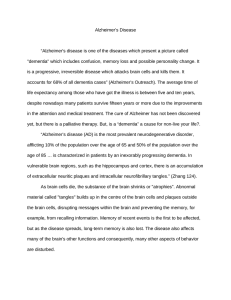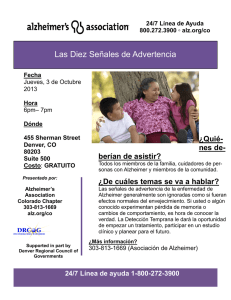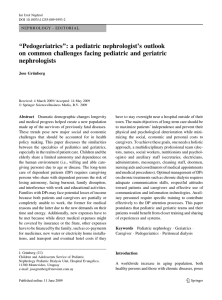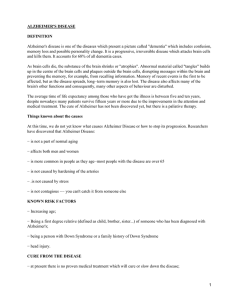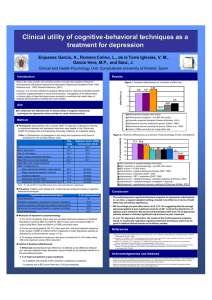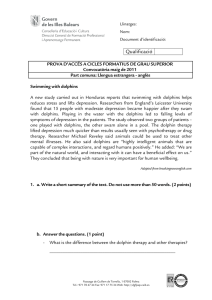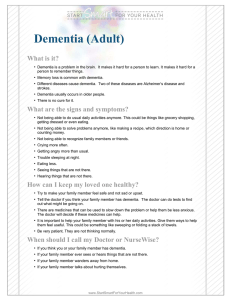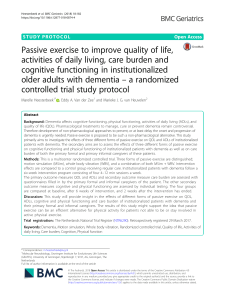Interventions for caregivers of patients with dementia
Anuncio
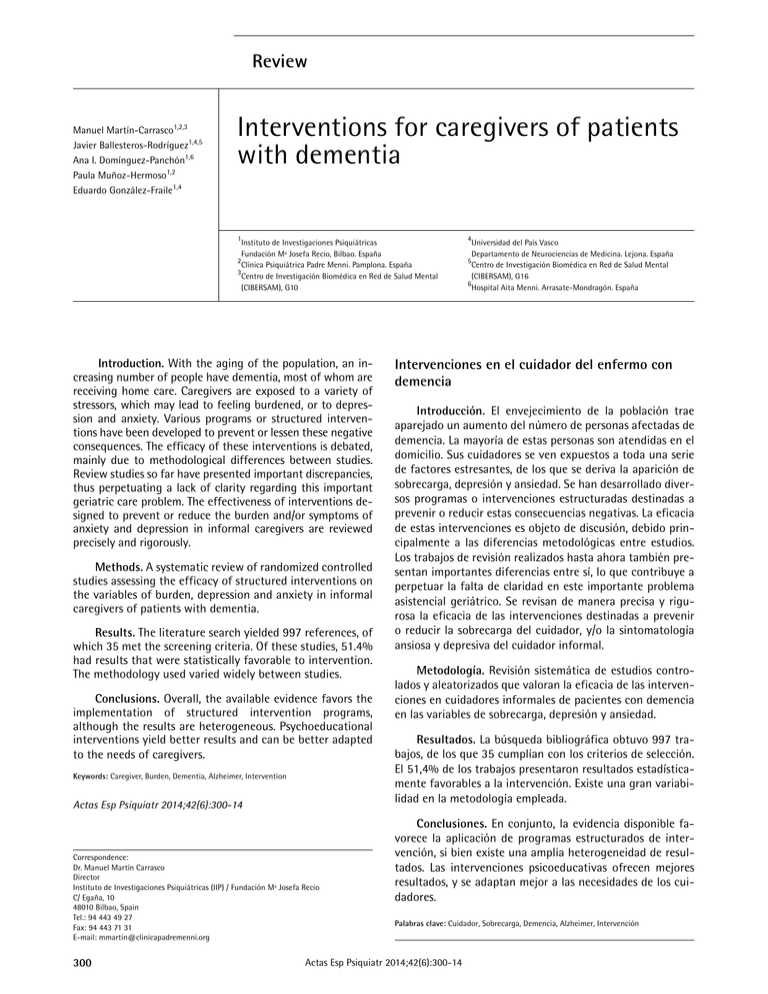
Review Manuel Martín-Carrasco1,2,3 Javier Ballesteros-Rodríguez1,4,5 Ana I. Domínguez-Panchón1,6 Paula Muñoz-Hermoso1,2 Eduardo González-Fraile1,4 Interventions for caregivers of patients with dementia 1 Instituto de Investigaciones Psiquiátricas Fundación Mª Josefa Recio, Bilbao. España 2 Clínica Psiquiátrica Padre Menni. Pamplona. España 3 Centro de Investigación Biomédica en Red de Salud Mental (CIBERSAM), G10 Introduction. With the aging of the population, an increasing number of people have dementia, most of whom are receiving home care. Caregivers are exposed to a variety of stressors, which may lead to feeling burdened, or to depression and anxiety. Various programs or structured interventions have been developed to prevent or lessen these negative consequences. The efficacy of these interventions is debated, mainly due to methodological differences between studies. Review studies so far have presented important discrepancies, thus perpetuating a lack of clarity regarding this important geriatric care problem. The effectiveness of interventions designed to prevent or reduce the burden and/or symptoms of anxiety and depression in informal caregivers are reviewed precisely and rigorously. Methods. A systematic review of randomized controlled studies assessing the efficacy of structured interventions on the variables of burden, depression and anxiety in informal caregivers of patients with dementia. Results. The literature search yielded 997 references, of which 35 met the screening criteria. Of these studies, 51.4% had results that were statistically favorable to intervention. The methodology used varied widely between studies. Conclusions. Overall, the available evidence favors the implementation of structured intervention programs, although the results are heterogeneous. Psychoeducational interventions yield better results and can be better adapted to the needs of caregivers. Keywords: Caregiver, Burden, Dementia, Alzheimer, Intervention Actas Esp Psiquiatr 2014;42(6):300-14 Correspondence: Dr. Manuel Martín Carrasco Director Instituto de Investigaciones Psiquiátricas (IIP) / Fundación Mª Josefa Recio C/ Egaña, 10 48010 Bilbao, Spain Tel.: 94 443 49 27 Fax: 94 443 71 31 E-mail: mmartin@clinicapadremenni.org 300 4 Universidad del País Vasco Departamento de Neurociencias de Medicina. Lejona. España 5 Centro de Investigación Biomédica en Red de Salud Mental (CIBERSAM), G16 6 Hospital Aita Menni. Arrasate-Mondragón. España Intervenciones en el cuidador del enfermo con demencia Introducción. El envejecimiento de la población trae aparejado un aumento del número de personas afectadas de demencia. La mayoría de estas personas son atendidas en el domicilio. Sus cuidadores se ven expuestos a toda una serie de factores estresantes, de los que se deriva la aparición de sobrecarga, depresión y ansiedad. Se han desarrollado diversos programas o intervenciones estructuradas destinadas a prevenir o reducir estas consecuencias negativas. La eficacia de estas intervenciones es objeto de discusión, debido principalmente a las diferencias metodológicas entre estudios. Los trabajos de revisión realizados hasta ahora también presentan importantes diferencias entre sí, lo que contribuye a perpetuar la falta de claridad en este importante problema asistencial geriátrico. Se revisan de manera precisa y rigurosa la eficacia de las intervenciones destinadas a prevenir o reducir la sobrecarga del cuidador, y/o la sintomatología ansiosa y depresiva del cuidador informal. Metodología. Revisión sistemática de estudios controlados y aleatorizados que valoran la eficacia de las intervenciones en cuidadores informales de pacientes con demencia en las variables de sobrecarga, depresión y ansiedad. Resultados. La búsqueda bibliográfica obtuvo 997 trabajos, de los que 35 cumplían con los criterios de selección. El 51,4% de los trabajos presentaron resultados estadísticamente favorables a la intervención. Existe una gran variabilidad en la metodología empleada. Conclusiones. En conjunto, la evidencia disponible favorece la aplicación de programas estructurados de intervención, si bien existe una amplia heterogeneidad de resultados. Las intervenciones psicoeducativas ofrecen mejores resultados, y se adaptan mejor a las necesidades de los cuidadores. Palabras clave: Cuidador, Sobrecarga, Demencia, Alzheimer, Intervención Actas Esp Psiquiatr 2014;42(6):300-14 Manuel Martín-Carrasco, et al. Interventions for caregivers of patients with dementia Introduction According to the latest report, Alzheimer’s Disease International World Alzheimer Report 2012, an estimated 36 million people worldwide have some form of dementia. This figure is expected to double every 20 years and reach 66 million in 2030.1 In Spain, a 2008 report from the Ministry of Social Affairs provides data from a current population of 7.4 million people over age 65 years, of which 31.9% had some kind of dependency. It is estimated that more than one-half million cases are related to dementia.2 Based on these data, the dementias in general can be considered a major priority for present and future social and health care. Although there are several options for patient care, they are insufficient and the family and patients often are reluctant to use them.3 The family thus becomes the primary provider of care. Several reports confirm that approximately 85% of patients with dementia are cared for exclusively by their families in their own homes.2,4 In most cases, the profile of the caregiver is a woman aged 45 to 70 years old who dedicates an average of 12 hours a day to caring for the patient.5,6 In most cases, these caregivers do not have enough information about the illness or they lack previous experience in caring for such a patient. Although these caregivers may experience positive intrinsic reinforcement and develop positive coping strategies that help them cope with the task of caregiving,7,8 negative consequences are also frequent, such as physical wear,9 financial effects,10 social isolation,11 or emotional changes.12,13 The emotional changes have been studied in depth in several review papers in which it is reported that 25% to 30% of caregivers experience anxiety, 15% to 20% have depressive symptoms,12,13 and about 73% experience emotional stress or feel burdened.14 The occurrence of this type of psychiatric disorders and the emotional burnout of caregivers can affect the patient, accelerating the process of institutionalization, among other negative consequences (e.g., abuse, physical restraint, and others).15 In order to prevent and reduce these negative consequences, various programs and structured interventions have been developed with the specific aim of increasing knowledge about the illness, caregiving skills, the search for support, and the caregiver’s own self-care.16 An attempt has been made to categorize and evaluate the effect of these interventions in several review papers.17-22 However, these reviews draw from substantially different methodological designs, for instance, in terms of the reference selection criteria, samples used, classification of inter- ventions, definition of intervention models, choice of outcome variables, and others. This is an obstacle to the reliable interpretation and comparison of results. The same can be said of the meta-analyses.21,23 For example, Knight24 combines different types of interventions and outcome variables. Sorensen25 and Zabalegui22 use samples from older adults who have different pathologies, in which the conditions and demands for care may be different. Brodaty26 combine outcome variables under the general designation of “psychological morbidity.” Many of these meta-analyses6,22,26,27 include studies using nonexperimental methods, which can lead to substantial bias.28 For our review of the literature, we examined and updated the available evidence about the effectiveness of the interventions that have been developed to reduce and/ or prevent the adverse psychological effects (depression, anxiety, and feeling over-burdened) that informal caregivers of patients with dementia may experience21,22 by using more accurate and reliable methodological criteria. Objective, Subjects, and Methods This aim of this study was to conduct a systematic review of the effectiveness of intervention programs (IPs) applied to the informal caregivers of patients with dementia living at home. Only evidence of the highest quality (level 1) was considered for this review,29 i.e., randomized controlled trials with quantitative data on the efficacy of the interventions measured with outcome variables that are widely used, validated in clinical practice, and refer to the psychological distress of caregivers (anxiety, depression, and feeling over-burdened). Possible studies were identified by systematically searching the following databases: Medline, Embase, PsycINFO, PsycARTICLES, and Cochrane Central. The search terms used were the combination of the following descriptors: [(caregiver OR care giver OR spouse OR family) AND (dementia OR alzheimer OR cognitive impairment) AND (intervention OR program OR therapy OR treatment OR psychoeducation OR information OR education OR counseling OR support)]. The searches were restricted to studies conducted with the methodology described above (randomized and controlled), published up to May 31, 2013. The studies included in the review had to satisfy the following selection criteria. Inclusion criteria: a) Randomized controlled trials b) A sample of informal caregivers of patients with de- Actas Esp Psiquiatr 2014;42(6):300-14 301 Manuel Martín-Carrasco, et al. Interventions for caregivers of patients with dementia Results mentia living in the community c) A sufficiently detailed description of a standardized intervention program (content of sessions, number of meetings, length, format, etc.) d) Evaluation of the effects of intervention using validated quantitative scales to measure any of these psychological constructs: depression, anxiety, or feeling over-burdened. Exclusion criteria: a) Studies with analysis carried out with sample data already published in earlier studies and not providing additional evidence b) Studies using increased formal support as a key element of the intervention c) Studies whose main objective was to train healthcare professionals and measure the effects on the caregiver. The texts were screened by independent peer review. If there was a lack of consensus among researchers, a third reviewer was recruited. 374 Repeated references 623 References 473 References eliminated after reading abstract The independent evaluators had a very good level of agreement (Kappa index 0.96). Based on the content of the interventions, the selected studies were grouped into the following categories: Nonprofessional support or support groups: group interventions consisting of informal caregivers whose main objective is to share experiences about care and common problems, and to offer mutual support.33 Counseling: a professional support intervention for the caregiver and family aimed at helping them understand the process of the illness, i.e., the symptoms, consequences, and caregiver reactions,27 and offering possible solutions for the specific problems identified.6 In order to facilitate reading and understanding, the results are presented in two ways: a) summarized according to the outcome variable (Table 1) and b) by more extensively describing the characteristics of each study according to the intervention category (Table 2). Depression 150 References 115 References eliminated based on selection criteria after reading full text 35 Studies selected 302 Three references were eliminated because they analyzed data reported in other publications.30-32 Thirty-five studies were finally selected (Figure 1). Psychoeducation: programs focused on improving understanding of the illness, self-care, and patient care. This category differs from the rest because it includes techniques specifically aimed at understanding and alleviating the mental distress of the caregiver (stress management, relaxation, thought control, self-control techniques, etc). 997 Potentially relevant references Figure 1 The searches identified 997 texts that could be included, of which 374 were repeated references and 473 were articles that were excluded after reading the summary because they did not satisfy the objectives established for the review. After reading the full text of the remaining references, 38 articles were identified that met the selection criteria. Flowchart of reference selection process Data were collected from 24 studies on the outcome variable “depression.” Most of these studies (62.5%) used the Center for Epidemiologic Studies Depression Scale34 to measure their results. Two studies presented the results of support interventions.35,36 In the study by Mahoney,35 a telephone helpline was provided so that caregivers could participate in a support group and receive professional help and information about the illness. In general terms, no statistically significant differences were found. In the study Actas Esp Psiquiatr 2014;42(6):300-14 Manuel Martín-Carrasco, et al. Table 1 Interventions for caregivers of patients with dementia Summary of the results of studies assessing the effectiveness of interventions in caregivers of patients with dementia Study Depression Burden Anxiety Support Winter & Gitlin, 2006 (36) Martin-Cook et al., 2003 - (35) - Counseling Zarit et al., 1987 (66) - Gaugler et al., 2008 + (37) + + Mittelman et al., 2008 (38) Dias et al., 2008 (69) - Gavrilova et al., 2009 (67) + - Fortinsky et al., 2009 (39) Guerra et al., 2011 - Joling et al., 2012 (40) Waldorff et al. 2012 + (68) - - - - - (41) Psychoeducation Hébert et al., 1994 (42) - Gendron et al., 1996 - - Ostwald et al., 1999 (44) - + Marriot et al., 2000 (45) + Coon et al., 2003 (43) - (47) Burns et al., 2003 (46) + Gallagher-Thompson et al. 2003 (48) + Hebert et al., 2003 - (70) Martin-Cook et al., 2003 (49) - Davis et al., 2004 (50) - + + Akkerman & Ostwald, 2004 (73) Losada-Baltar et al., 2004 Gonyea et al., 2006 - (51) - (60) Gallagher-Thompson et al., 2007 (53) + Finkel et al., 2007 (52) + Márquez-González et al., 2007 (58) + Chien & Lee, 2008 + (64) Martín-Carrasco et al., 2009 + (5) Gallagher-Thompson et al., 2010 (54) - Gitlin et al., 2010 (55) + Kurz et al., 2010 (56) - + + Chien & Lee, 2011 (63) De Rotrou et al., 2011 - - (72) + Losada et al., 2011 (57) +: Statistically significant results. –: Statistically nonsignificant results. Actas Esp Psiquiatr 2014;42(6):300-14 303 Manuel Martín-Carrasco, et al. Interventions for caregivers of patients with dementia Experimental studies that evaluate the effects of interventions in informal caregivers of patients with dementia Table 2 Study Sample initial (N: IG/CG) Interventions Scales Results Winter & Gitlin, 2006 (36) 103: 58/45 IG: telephone support group (1 hour weekly) CG: usual treatment Depression: 20CESD No significant changes at 6 months Mahoney et al., 2003 (35) 100: 49/51 IG: telephone support system offering caregivers emotional support and information about aspects related with the disease and behavioral aspects of the patient for 12 months. Caregivers used the service for a mean of 55 minutes CG: usual treatment Anxiety: STAI Depression: 20CESD No significant changes were observed in any of the outcome variables, except for participants who had worse scores at baseline 119: 36/44/39 IG: individual counseling program lasting 8 weeks with information about the illness, problem solving techniques, and search for services and support. In one session, a family member of the caregiver is included CG: similar intervention in group format and in a more open format called support CG: waiting list Burden: 22-ZBI No significant changes observed at the posttreatment visit or follow-up visit at one year 387: 191/194 IG: individual-family counseling and group support for 4 months (6 sessions). CG: usual treatment Burden: 15-ZBI Depression: 30GDS Significant improvement in depression and burden variables over a period of 9.5 years Depression: BDI Improvement at 24 months versus control group Apoyo Counseling Zarit et al., 1987 (66) Gaugler et al., 2008 (37) Mittelman et al., 2008(38) 158: 79/79 IG: 5 counseling sessions: 2 individual, 3 family, counseling on demand during 3 months CG: usual treatment Dias et al., 2008 (69) Gavrilova et al., 2009 (67) 304 81: 41/40 IG: personalized intervention with information about the illness, education on the behavior management of the patient, group and personal support, medical followup CG: waiting list Burden: 22-ZBI Nonsignificant reduction at 3 and 6 months of intervention 60: 30/30 IG: personalized intervention consisting of 3 modules (assessment, basic education, and behavioral management training) in five weekly 1.5-hour sessions CG: usual treatment Burden: 22-ZBI Significant improvement (p=0.01) in the experimental group compared to the control group at 6 months Actas Esp Psiquiatr 2014;42(6):300-14 Manuel Martín-Carrasco, et al. Table 2 Interventions for caregivers of patients with dementia Continuation Study Sample initial (N: IG/CG) Fortinsky et al., 2009 (39) 84:54/30 IG: monthly individualized contact with a therapist for 12 months (plan of action, information about the illness, available services, etc.) CG: information about the illness and available services Burden: 22-ZBI Depression: 20CESD At 12 months, no significant improvement in the depression (p=0.41) and burden (p=0.73) variables Guerra et al., 2011 (68) 56: 27/29 IG: personalized intervention consisting of 3 modules (assessment, basic education, and behavioral management training) for five weekly 30-minute sessions CG: usual treatment Burden: 22-ZBI Significant changes were observed in the burden variable (p<0.001) Joling et al., 2012 (40) 192: 96/96 IG: 6 family counseling sessions where information about problem-solving techniques, family networks, and emotional and instrumental support was offered CG: usual treatment Depression: 20CESD Anxiety: HADS-A Burden: CRA No decrease in the risk of developing anxiety, depression, or burden was observed in the participants in the intervention group Depression: 30GDS Significant improvement was observed in the depression variable at 6 months, but this effect dissipated in the follow-up measurement at 12 months Waldorff et al. 2012 (41) Interventions 330:167/163 IG: 7 or more counseling sessions, complemented by more than 3 information sessions and telephone follow-up with up to 8 calls CG: support group Scales Results Psychoeducation Hébert et al., 1994 (42) 41:23/18 IG: Eight 3-hour group sessions with information about the illness, problemsolving, role-playing, and relaxation techniques CG: option to participate in monthly meetings of the local Alzheimer Society Burden: 22-ZBI Depression: BSI Anxiety: BSI There were no significant changes in any variables at 8 months Gendron et al., 1996 (43) 35:17/18 IG: 8 sessions of cognitive behavioral intervention aimed at improving coping strategies, problem solving, cognitive restructuring, and dysfunctional thoughts CG: information and support group where issues such as age, health, available services, and others are treated Anxiety: HSC Depression: HSC Burden: 22-ZBI No significant changes at 6 months of the intervention Ostwald et al., 1999 (44) 117:72/45 IG: 7-week (2 hours per session) intervention in multimedia format in which caregivers are offered information about the illness, patient management, improved self-efficacy, improved communication, and problem handling CG: waiting list Burden: 22-ZBI Depression: 20CESD Significant changes were observed in the burden variable at 3 and 5 months. The depression variable does not indicate significant changes Actas Esp Psiquiatr 2014;42(6):300-14 305 Manuel Martín-Carrasco, et al. Interventions for caregivers of patients with dementia Continuation Table 2 Study Marriot et al, 2000 (45) Sample initial (N: IG/CG) Interventions 42:14/14/14 IG: 14 biweekly sessions with 3 sessions of education on the illness, 6 for stress management and coping training, and 5 sessions of coping with situations with the patient CG: Semistructured interview CG: no intervention Scales Results Depression: BDI Significant changes are observed in the intervention group at 9 and 12 months into the study Coon et al. 2003 (47) 169: 53/64/52 IGa: 6 weekly 2-hour group sessions on managing anger and frustration with cognitive-behavioral content, management of negative thoughts, and relaxation skills training IGb: management of depression centering on the relation between mood and pleasurable events CG: waiting list Depression: MAACL subscale No significant changes were obtained at 4 months compared to the control group Burns et al., 2003 (46) 76: 37/39 IGa: 25 brochures on the behavioral aspects of the patient IGb: 25 brochures on the behavioral aspects of the patient + 12 on the management and reduction of stress and caregiver distress Depression: 20CESD Lower risk of depression at 24 months in the group that received caregiver-specific information Depression: 20-CES-D The participants in the intervention group significantly reduced their levels of depression versus controls Gallagher-Thompson et al. 2003 (48) 213:108/105 IG: ten weekly 2-hour sessions with cognitive-behavioral management focused on controlling negative emotions, improving communication, relaxation techniques, and the creation of pleasurable activities CG: weekly support group Hébert et al., 2003 (70) 116: 60/56 IG: 15 weekly sessions with content focused on cognitive aspects of the caregiver and coping strategies CG: group support Burden: 22-ZBI Anxiety: STAI No significant changes versus the control group at 4 months Martin-Cook et al., 2003 (49) 37: 19/18 IG: four weekly 2-hour group sessions on basic aspects of the illness, behavioral management, environmental improvement, management of emotions, and coping skills CG: waiting list Depression: 20CESD No statistically significant changes between groups at 6 and 14 weeks Burden: SCB-A Depression: GDRS Significant improvement in the burden variable in the intervention groups. No change in the depression variable Davis et al., 2004 (50) 306 34:18/10/16 IG: at-home intervention with 12 weekly sessions to teach techniques for behavioral management of the patient, problem solving, management of emotions, and relaxation techniques IG: the same intervention by telephone. CG: Periodic care contact Actas Esp Psiquiatr 2014;42(6):300-14 Manuel Martín-Carrasco, et al. Interventions for caregivers of patients with dementia Continuation Table 2 Study Sample initial (N: IG/CG) Interventions 35: 18/17 IG: nine 2-hour group sessions with content on anxiety control techniques (cognitive, behavioral, and physical) CG: waiting list Anxiety: BAI / HAM-A Significant changes observed at the end of intervention (10 weeks) on both scales (p<0.01) 31: 12/15/4 IGa: cognitive-behavioral program consisting of eight weekly 2-hour sessions for modifying dysfunctional thoughts IGb: program of problem-solving strategies CG: no intervention Depression: 20CESD No significant changes in the depression variable Gonyea et al., 2006 (60) 80:40/40 IG: intervention consisting of five weekly 90-minute sessions in which participants were offered information about the illness, improving communication, creating pleasurable events, behavior management, and preparation for future events. All sessions included a relaxation exercise CG: basic information Burden: 12-ZBI No significant changes versus the control group at 6 weeks Gallagher-Thompson et al., 2007 (53) 45: 22/23 IG: six individualized 90-minute sessions with information about the illness, behavioral management of the patient, control of negative thoughts, communication-related issues, end of life, and promotion of pleasurable moments CG: telephone support Depression: 20CESD Significant reduction (p=0.017) in the levels of depression in the intervention group versus control group Finkel et al., 2007 (52) 36: 17/19 IG: telephone intervention for 6 months with information about resources, strategies, improving communication, selfcare, and behavioral management of the patient. The intervention included group support sessions and skill training CG: basic information Depression: 10CESD Significant decrease in levels of depression (p=0.009) at 6 months, which was more marked in subjects with high levels of depression at baseline Márquez-González et al., 2007 (58) 74:34/40 IG: intervention consisting of eight 2-hour weekly group sessions with a module for detection and modification of dysfunctional thoughts and a module for other coping skills training aimed at improving the patient's attention capacity (search for support, relaxation, and pleasurable activities) CG: waiting list Depression: 20-CES-D Results statistically favorable for the intervention group Chien & Lee, 2008 (64) 88: 44/44 IG: 12 bi-weekly sessions lasting hours: guidance and information about dementia, family role-playing, strengths management, and use of community resources CG: usual treatment Burden: FCBI Significant improvement (p<0.001) in the intervention group at 12 months Akkerman & Ostwald, 2004 (73) Losada-Baltar et al., 2004 (51) Actas Esp Psiquiatr 2014;42(6):300-14 Scales Results 307 Manuel Martín-Carrasco, et al. Interventions for caregivers of patients with dementia Continuation Table 2 Study Sample initial (N: IG/CG) Interventions Martín-Carrasco et al., 2009 (5) 105: 55/60 IG: structured intervention consisting of eight 90-minute sessions for 4 months with information about the illness, behavioral management of the patient, management of negative thoughts, improving communication skills, and pleasurable activities CG: waiting list Burden: 22-ZBI Significant improvements observed in the treatment group at 10 months into the study (p<0.01) Gallagher-Thompson et al., 2010 (54) 70: 36/34 IG: Informative DVD of 2.5 hours duration with information about the illness, caregiver stress, behavioral management of the patient, effective communication, resource use, and legal aspects related to end of life CG: DVD with basic information on the illness Depression: 20CESD No significant changes in the intervention group Gitlin et al., 2010 (55) 120: 114/106 IG: intervention with an acute intervention of 16 weekly sessions with an occupational therapist who develops a personalized action plan (stress reduction, self-care, and improved care skills) and a maintenance phase (16-24 weeks) by telephone contacts CG: no intervention Depression: 10CESD Burden: 12-ZBI Significant reduction in outcome variables at 16 and 24 weeks (p<0.05) Kurz et al., 2010 (56) 121: 115/106 IG: seven 90-minute sessions with information about the illness in its various phases (early, middle, end) which are completed with 6 sessions of reinforcement CG: a counseling session Depression: MADRS No significant changes in the burden variable at 15 months Chien & Lee, 2011 (63) 92: 46/46 IG: 10 bi-weekly 2-hour home visits providing information, psychological support, social support, and problem-solving strategies CG: usual treatment Burden: FCBI Significant improvement (p<0.001) in the intervention group at 18 months De Rotrou et al., 2011 (72) 115: 57/58 IG: twelve 2-hour weekly sessions with information about the illness, problemsolving training, coping strategies focused on emotion, behavior management of the patient, improving communication, handling difficult situations, and available resources CG: waiting list Burden: 22-ZBI No significant changes at 3 and 6 months 308 Actas Esp Psiquiatr 2014;42(6):300-14 Scales Results Manuel Martín-Carrasco, et al. Interventions for caregivers of patients with dementia Continuation Table 2 Study Losada et al., 2011 (57) Sample initial (N: IG/CG) 167:88/79 Interventions Scales IG: twelve weekly 2-hour group sessions similar to the intervention described in Márquez-González et al., 2007(58) with more attention to identifying the barriers that keep them from enjoying pleasurable activities CG: waiting list Depression: 20-CES-D Results Statistically favorable results for the intervention group BAI: Beck Anxiety Inventory. BDI: Beck Depression Inventory. BSI: Brief Symptom Inventory. CRA: Caregiver Reaction Assessment. CES-D: Center for Epidemiologic Studies Depression Scale. FCBI: Family Caregiving Burden Inventory. CG: Control group. GDS: Geriatric Depression Scale. GDRS: Geriatric Depression Rating Scale. IG: Intervention group. HADS-A: Hospital Anxiety and Depression Scale – Anxiety. HAD-S: Hospital Anxiety and Depression Scale. HAM-A: Hamilton Anxiety Rating Scale. HSC: Hopkins Symptom Checklist. MAACL: Multiple Affect Adjective Checklist. MADRS: Montgomery-Asberg Depression Rating Scale. SCB-A: Screen for Caregiver Burden. STAI: State-Trait Anxiety Inventory. ZBI: Zarit Burden Interview. of Winter36 no statistically significant results were obtained at 6 months after applying the support intervention, except for participants over 65 years old. Among the studies assessing the effectiveness of “counseling” type interventions in depression,37-41 only the studies of Gaugler37 and Mittelman,38 which combined individual and family counseling for 4 and 6 months, respectively, obtained statistically significant results for the depression variable. Walldorf41 finds significant changes after the intervention, but they taper off after 12 months. In the 17 studies with psychoeducational interventions that assessed effectiveness for depression,42-56 8 yielded statistically significant results.45,46,48,52,53,55,57,58 Ostwald44 studied a multimedia intervention that combines information with patient management and self-care techniques, obtaining results that were positive but not significant. Gendron43 finds little difference after the intervention. Marriot45 obtains significantly positive results from an intervention centered on relaxation and coping techniques. Burns46 compares the results of two similar interventions (Behavior Care and Enhanced Care) in a sample of 76 caregivers. In one intervention, the caregivers were given information about the behavioral aspects of the illness in the form of information leaflets. In the other intervention, which includes information about stress reduction and caregiver distress, a significant reduction in the risk of developing depression was achieved at 24 months, as well as an improvement in the level of well-being. Martin-Cook49 assesses the effectiveness of an intervention consisting of 4 weekly sessions without finding any statistically significant differences compared to a basic educational intervention. Gallagher-Thompson48,53,54 have studied the effects of an in- tervention called CWC (“Coping with Caregiving”), which includes a wide variety of content (i.e., information about the disease, behavioral management of the patient, control of negative thoughts, issues related to communication, end of life, and encouragement to seek pleasurable moments) versus minimum support interventions48,53 and information.54 In the first two studies, in which the intervention was for subjects who were present, good results are obtained. Finally, in the last study54 the intervention was implemented using a multimedia format (DVD) without finding an evident advantage. In Spain, Losada-Baltar,51,57,58 using an intervention similar to that of Gallagher-Thompson, focused on cognitive-behavioral issues related to the experience of informal caregiving, and found favorable results for the variables of stress, reduction of dysfunctional thoughts, and depression. Meanwhile, Finkel52 applies a psychoeducational intervention by telecommunication called CTIS (“Computer-Telephone Integration System”), in which the caregiver receives an intervention with different types of content: information, resource use, improved communication, behavior management, and group support. The intervention program and its novel delivery system seem to obtain positive results at 6 months of treatment as compared to the use of merely informative materials. Gitlin55 proposes a 16-session intervention and reports significant improvement (p<0.05) at 16 and 24 weeks after starting treatment in a sample of 120 families. Finally, Kurz56 applied a 7-session psychoeducational intervention centering on the different phases (early, middle, and late) of the illness and its difficulties, finding no significant changes in the depression variable at 15 months of implementation. Actas Esp Psiquiatr 2014;42(6):300-14 309 Manuel Martín-Carrasco, et al. Interventions for caregivers of patients with dementia Burden The effectiveness of interventions on the burden variable is addressed in 18 studies. The predominant measurement instrument is the Zarit scale.59 Gonyea and Gitlin55,60 use two shorter versions with 12 items.61,62 Chien and Lee63,64 opt for the Family Caregiver Burden Inventory.65 The work of Zarit66 is one of the first studies to assess the effectiveness of this type of intervention. A family counseling intervention is proposed that manages to reduce the caregiver burden by levels that are almost statistically significant. Gaugler37 achieves favorable results at 9.5 years with a counseling intervention (NYUCI - New York University Caregiver Intervention) to reduce the burden, as measured using a modified version of the Zarit Burden Inventory. Within this category, the studies produced by the research groups of the “10/66” project pertaining to Alzheimer’s Disease International and led by Gavrilova67 and Guerra68 are noteworthy. Both apply a personalized intervention consisting of a first stage of case assessment, followed by basic education and training in behavior management techniques. The intervention has been shown to produce significant changes at 6 months in the burden variable. Dias69 proposes a similar personalized intervention in which caregivers receive information about the illness, group support, and medical follow-up. The results, however, do not show significant changes in the visits at 3 and 6 months after initiating the intervention. Meanwhile, the work of Fortinsky and Joling39,40 with individual and family counseling interventions, respectively, obtained more discrete results for the burden variable. Overall, the psychoeducational interventions showed better burden results. Ostwald44 finds significant changes after implementing a psychoeducational program. Hébert70 uses an intervention centered on the cognitive aspects of caregiver coping without observing a significant reduction in burden levels at 4 months. Gonyea60 and Martin-Carrasco5 use the same intervention designed for the first REACH (Resources for Enhancing Alzheimer’s Caregiver Health) project,48,71 which includes sessions with information about the illness, behavioral management of the patient, improvement of communication, creation of pleasurable events, planning for the end of life, and relaxation exercises. While Gonyea60 does not seem to obtain statistically significant results, the sample of 105 caregivers studied by Martín-Carrasco5 experiences significant improvement at 10 months into the program. Chien and Lee63,64 propose two individualized psychoeducational interventions in which different contents are used. As with the depression variable, statistically significant favorable results are found compared to standard treatment or counseling. Gitlin55 proposes an individualized intervention in which the established objectives are stress reduction 310 and improved care and self-care skills. This intervention is reinforced by a maintenance plan of telephone contacts for 16 to 24 weeks. The results reveal significant changes in the depression and burden variables. Finally, de Rotrou72 presents a methodologically precise work in which the effect of a highly structured psychoeducational intervention is studied. The results observed in the visits at 3 and 6 months indicate stabilization of the burden levels in the experimental arm compared with increased burden in the control group. Anxiety Only 6 of the 33 studies selected collect information on the effectiveness in reducing or preventing the anxiety of informal caregivers. There is no predominant measurement instrument. Generally speaking, the interventions do not significantly change the levels of anxiety of caregivers. Neither the Mahoney35 telephone support intervention nor the Joling40 family counseling intervention appear to produce significantly positive changes in the anxiety levels of caregivers. Early studies of the psychoeducational interventions found no differences with regard to the control group. The techniques of cognitive-behavioral modification intervention proposed by Hébert70 have a positive impact on the anxiety variable compared to the control group without reaching statistically significant values (p=0.09). Finally, Akkerman and Ostwald73 assessed the efficacy of a group cognitive-behavioral intervention, which consisted of nine sessions of 2 hours’ duration in which the attendees were trained in techniques for the control of anxiety in its three main components (cognitive, behavioral, and physical). The Beck Anxiety Inventory74 and the Hamilton Anxiety Scale75 were used to measure the results of the intervention. Significant changes (p<0.01) were obtained for both scales at 10 months after initiating the intervention. Discussion Caring for patients with dementia at home can have negative consequences for the caregiver, particularly in the emotional sphere.76 Current figures on the prevalence of dementia and forecasts for the future alert us to the pressing need to intervene in order to improve the situation of patients and informal caregivers. Interventions aimed at reducing the negative psychological consequences derived from caring for a family member with dementia vary in form, content, and results. The objective of this study was to review and rigorously update the available evidence. Actas Esp Psiquiatr 2014;42(6):300-14 Manuel Martín-Carrasco, et al. Interventions for caregivers of patients with dementia In the process of reviewing and selecting studies, many studies that did not meet the methodological criteria were discarded. Examples of methodological shortcomings include the use of non-validated instruments, implementation of non-standard interventions, indirect interventions on the caregiver, and others. Similarly, in order to avoid bias, only studies with an experimental design were included. These circumstances considerably reduced the number of studies considered compared to other reviews.6,21,23 The 35 studies selected were grouped into three categories: group or nonprofessional support, counseling, and psychoeducation. The results show that intervention programs have a beneficial effect on the caregiver’s psychological status, although this effect only reached significance in one-half of the studies (51.4%). Among the studies that assess the depression and burden variables, psychoeducational interventions were the most effective, followed by counseling interventions. Our results coincide with those found by other authors.6,22,23,26,27 The favorable (albeit not statistically significant) trend of most studies and their limited number (anxiety variable and the support group category) suggest a possible publication bias that should be studied further. Due to the high heterogeneity of the application formats and the disparity of results, it is difficult to identify potential modulating factors of effectiveness. With regard to the format of the interventions, 45.71% of the studies applied individualized interventions, of which 62.5% have statistically favorable results.37,50,55,63,67,68 Such interventions with custom content may be more useful for caregivers because they adapt best to their specific needs. However, the methodological problem is how to correctly define the intervention, replicate the results, and compare the intervention with other programs. In this sense, it is interesting to note the possibility of combining a group intervention with an individualized intervention. This dual format can meet the specific needs of the family while offering support from other caregivers. Regarding the intensity of the interventions, it has been noted on several occasions that an intervention with more content or a larger number of sessions is not always convenient, as caregivers may be overwhelmed by the demands of compliance with the program.25,48 Studies not requiring the presence of the caregiver or very short interventions have attempted to overcome this problem, but they have not had favorable results and also raise questions about whether participants are self-administering the programs properly.35,36,54 In our study, we attempted to quantify the intensity of the interventions. It should be noted that many studies included components that are difficult to objectify (e.g., telephone contact, clinical monitoring, care on demand, and others). As a result of our experience, we think it is important to try to maintain a reasonable balance between the number and intensity of the sessions and to keep program content flexible so that missing a session does not condition the overall benefit from the intervention. Many of the drop outs that occur in these studies are due to caregivers who fail to maintain the continuity of the intervention and then decide to leave the program. However, it seems that the key to the effectiveness of these interventions lies in the active participation of the attendees, which is favored by the use of role-playing techniques, skills training, exercises focusing on analysis of the situation, background, and consequences, and the continuous repetition of exercises (exercises for home and subsequent corrections) until a routine is established in their way of acting and thinking. At the same time, it offers a more open and less intensive follow-up after the intervention, which may be beneficial because it allows the caregiver to address new issues as they arise.41,55 It should be remembered that most dementias advance progressively, with the new stages being accompanied by new problems and challenges that the caregiver must face. In this sense, several authors19,54 have discussed the need to establish criteria or indicators (state and severity of the illness, the caregiver’s situation or characteristics, and others) to help clinicians decide when it is advisable to implement such interventions. As for the studies in which the intervention has been found to have positive effects on the outcome variables36,51 despite not reaching statistical significance, there are two possible explanations. Firstly, the quantitative measuring instruments may not be sufficiently sensitive to change to reflect the effects of the interventions. Secondly, in the case of informal caregivers of patients with dementia, psychological issues such as depression, anxiety, and the feeling of being over-burdened may be elements that are “crystallized,” relatively stable, and difficult to modify. Therefore, it would be interesting to include complementary assessment systems that are more focused on detecting clinical significance77 and can measure possible changes from another perspective that might be closer to the personal reality of the caregiver and patient. In conclusion, we believe that intervention programs are beneficial and advisable for reducing and preventing the psychological distress of the informal caregivers of patients with dementia. However, it must be emphasized that this is a relatively new area of study and there are still important gaps in knowledge. Despite the many studies that deal with the distress of informal caregivers and propose potential interventions, few satisfy methodological criteria for quality. It is therefore necessary to further the development of valid intervention tools and conduct studies to help more accurately determine the effectiveness of such interventions, in addition to the factors that modulate response. Actas Esp Psiquiatr 2014;42(6):300-14 311 Manuel Martín-Carrasco, et al. Interventions for caregivers of patients with dementia Conflicts of Interests None of the authors declares any conflict of interest references 1. Batsch NL, Mittelman M. Overcoming the stigma of dementia: Alzheimer’s Disease International, 2012. 2. Imserso. Las personas mayores en España: informe 2008. Datos estadísticos estatales y por Comunidades Autónomas: Instituto de Mayores y Servicios Sociales, 2008. 3. Crespo M, López J. El apoyo a los cuidadores de familiares mayores dependientes en el hogar: desarrollo del programa “Cómo mantener su bienestar”. Instituto de Mayores y Servicios Sociales, 2007. 4. Schneider J, Murray J, Banerjee S, Mann A. EUROCARE: a crossnational study of co-resident spouse carers for people with Alzheimer’s disease: Factors associated with carer burden. Int J Geriatr Psychiatry. 1999;14(8):651-61. 5. Martin-Carrasco M, Martin MF, Valero CP, Millan PR, Garcia CI, Montalban SR, et al. Effectiveness of a psychoeducational intervention program in the reduction of caregiver burden in Alzheimer’s disease patients’ caregivers. Int J Geriatr Psychiatry. 2009;24(5):489-99. 6. Pinquart M, Sorensen S. Helping caregivers of persons with dementia: which interventions work and how large are their effects? Int Psychogeriatr. 2006;18(4):577-95. 7. Cohen CA, Colantonio A, Vernich L. Positive aspects of caregiving: rounding out the caregiver experience. Int J Geriatr Psychiatry. 2002;17(2):184-8. 8. Fernandez-Lansac V, Crespo Lopez M, Caceres R, Rodriguez-Poyo M. Resiliencia en cuidadores de personas con demencia: estudio preliminar. Rev Esp Geriatr Gerontol. 2012;47(3):7. 9. Vitaliano PP, Zhang J, Scanlan JM. Is caregiving hazardous to one’s physical health? A meta-analysis. Psychol Bull. 2003;129(6):946-72. 10.Jonsson L, Wimo A. The cost of dementia in Europe: a review of the evidence, and methodological considerations. Pharmacoeconomics. 2009;27(5):391-403. 11.Lowery K, Mynt P, Aisbett J, Dixon T, O’Brien J, Ballard C. Depression in the carers of dementia sufferers: a comparison of the carers of patients suffering from dementia with Lewy bodies and the carers of patients with Alzheimer’s disease. J Affect Disord. 2000;59(1):61-5. 12.Cooper C, Balamurali TB, Livingston G. A systematic review of the prevalence and covariates of anxiety in caregivers of people with dementia. Int Psychogeriatr. 2007;19(2):175-95. 13.Cuijpers P. Depressive disorders in caregivers of dementia patients: a systematic review. Aging Ment Health. 2005;9(4):32530. 14.Alonso Babarro A, Garrido Barral A, Diaz Ponce A, Casquero Ruiz R, Riera Pastor M. Perfil y sobrecarga de los cuidadores de pacientes con demencia incluidos en el programa ALOIS. Aten Primaria. 2004;33(2):61-6. 15.Kurasawa S, Yoshimasu K, Washio M, Fukumoto J, Takemura S, Yokoi K, et al. Factors influencing caregivers’ burden among family caregivers and institutionalization of in-home elderly people cared for by family caregivers. Environmental health and preventive medicine. 2012;17(6):474-83. 16.Bourgeois MS, Schulz R, Burgio L. Interventions for caregivers of patients with Alzheimer’s disease: a review and analysis of content, process, and outcomes. Int J Aging Hum Dev. 1996;43(1):35-92. 312 17. Cooper C, Balamurali TB, Selwood A, Livingston G. A systematic review of intervention studies about anxiety in caregivers of people with dementia. Int J Geriatr Psychiatry. 2007;22(3):1818. 18.Dunkin JJ, Anderson-Hanley C. Dementia caregiver burden: a review of the literature and guidelines for assessment and intervention. Neurology. 1998;51(1 Suppl 1):S53-60; discussion S5-7. 19. Gallagher-Thompson D, Coon DW. Evidence-based psychological treatments for distress in family caregivers of older adults. Psychology and aging. 2007;22(1):37-51. 20. Llanque SM, Enriquez M. Interventions for Hispanic caregivers of patients with dementia: a review of the literature. Am J Alzheimers Dis Other Demen. 2012;27(1):23-32. 21. Olazaran J, Reisberg B, Clare L, Cruz I, Pena-Casanova J, Del Ser T, et al. Nonpharmacological therapies in Alzheimer’s disease: a systematic review of efficacy. Dementia and geriatric cognitive disorders. 2010;30(2):161-78. 22.Zabalegui Yarnoz A, Navarro Diez M, Cabrera Torres E, Gallart Fernandez-Puebla A, Bardallo Porras D, Rodriguez Higueras E, et al. Eficacia de las intervenciones dirigidas a cuidadores principales de personas dependientes mayores de 65 años. Una revisión sistemática. Rev Esp Geriatr Gerontol. 2008;43(3):15766. 23.Chien LY, Chu H, Guo JL, Liao YM, Chang LI, Chen CH, et al. Caregiver support groups in patients with dementia: a metaanalysis. Int J Geriatr Psychiatry. 2011;26(10):1089-98. 24.Knight BG, Lutzky SM, Macofsky-Urban F. A meta-analytic review of interventions for caregiver distress: recommendations for future research. Gerontologist. 1993;33(2):240-8. 25.Sorensen S, Pinquart M, Duberstein P. How effective are interventions with caregivers? An updated meta-analysis. Gerontologist. 2002;42(3):356-72. 26. Brodaty H, Green A, Koschera A. Meta-analysis of psychosocial interventions for caregivers of people with dementia. J Am Geriatr Soc. 2003;51(5):657-64. 27.Acton GJ, Kang J. Interventions to reduce the burden of caregiving for an adult with dementia: a meta-analysis. Res Nurs Health. 2001;24(5):349-60. 28. Higgins JPT, Green S, Collaboration C. Cochrane handbook for systematic reviews of interventions. Wiley-Blackwell, 2008. 29.OCEBM LoEWG. The Oxford 2011 Levels of Evidence 2011: Recuperado de: http://www.cebm.net/index.aspx?o=5653. 30. Mittelman MS, Haley WE, Clay OJ, Roth DL. Improving caregiver well-being delays nursing home placement of patients with Alzheimer disease. Neurology. 2006;67(9):1592-9. 31.Mittelman MS, Roth DL, Coon DW, Haley WE. Sustained benefit of supportive intervention for depressive symptoms in caregivers of patients with Alzheimer’s disease. Am J Psychiatry. 2004;161(5):850-6. 32. Rabinowitz YG, Mausbach BT, Coon DW, Depp C, Thompson LW, Gallagher-Thompson D. The moderating effect of self-efficacy on intervention response in women family caregivers of older adults with dementia. Am J Geriatr Psychiatry. 2006;14(8):6429. 33.Gonyea JG. Alzheimer’s disease support groups: an analysis of their structure, format and perceived benefits. Social work in health care. 1989;14(1):61-72. 34.Radloff L. The CES-D scale: a self-report depression scale for research in the general population. Applied Psychological Measurement. 1977;1:16. 35.Mahoney DF, Tarlow BJ, Jones RN. Effects of an automated telephone support system on caregiver burden and anxiety: findings from the REACH for TLC intervention study. Actas Esp Psiquiatr 2014;42(6):300-14 Manuel Martín-Carrasco, et al. Interventions for caregivers of patients with dementia Gerontologist. 2003;43(4):556-67. 36.Winter L, Gitlin LN. Evaluation of a telephone-based support group intervention for female caregivers of communitydwelling individuals with dementia. Am J Alzheimers Dis Other Demen. 2007;21(6):391-7. 37. Gaugler JE, Roth DL, Haley WE, Mittelman MS. Can counseling and support reduce burden and depressive symptoms in caregivers of people with Alzheimer’s disease during the transition to institutionalization? Results from the New York University caregiver intervention study. J Am Geriatr Soc. 2008;56(3):421-8. 38. Mittelman MS, Brodaty H, Wallen AS, Burns A. A three-country randomized controlled trial of a psychosocial intervention for caregivers combined with pharmacological treatment for patients with Alzheimer disease: effects on caregiver depression. Am J Geriatr Psychiatry. 2008;16(11):893-904. 39.Fortinsky RH, Kulldorff M, Kleppinger A, Kenyon-Pesce L. Dementia care consultation for family caregivers: collaborative model linking an Alzheimer’s association chapter with primary care physicians. Aging Ment Health. 2009;13(2):162-70. 40. Joling KJ, van Marwijk HW, Smit F, van der Horst HE, Scheltens P, van de Ven PM, et al. Does a family meetings intervention prevent depression and anxiety in family caregivers of dementia patients? A randomized trial. PLoS One. 2012;7(1):e30936. 41. Waldorff FB, Buss DV, Eckermann A, Rasmussen ML, Keiding N, Rishoj S, et al. Efficacy of psychosocial intervention in patients with mild Alzheimer’s disease: the multicentre, rater blinded, randomised Danish Alzheimer Intervention Study (DAISY). BMJ. 2012;345:e4693. 42. Hebert R, Leclerc G, Bravo G, Girouard D, Lefrancois R. Efficacy of a support group programme for care-givers of demented patients in the community: a randomized controlled trial. Archives of gerontology and geriatrics. 1994;18(1):1-14. 43.Gendron C, Poitras L, Dastoor DP, Perodeau G. Cognitivebehavioral group intervention for spousal caregivers: Findings and clinical considerations. Clinical Gerontologist. 1996;17(1):319. 44. Ostwald SK, Hepburn KW, Caron W, Burns T, Mantell R. Reducing caregiver burden: a randomized psychoeducational intervention for caregivers of persons with dementia. Gerontologist. 1999;39(3):299-309. 45.Marriott A, Donaldson C, Tarrier N, Burns A. Effectiveness of cognitive-behavioural family intervention in reducing the burden of care in carers of patients with Alzheimer’s disease. Br J Psychiatry. 2000;176:557-62. 46. Burns R, Nichols LO, Martindale-Adams J, Graney MJ, Lummus A. Primary care interventions for dementia caregivers: 2-year outcomes from the REACH study. Gerontologist. 2003;43(4):54755. 47. Coon DW, Thompson L, Steffen A, Sorocco K, Gallagher-Thompson D. Anger and depression management: psychoeducational skill training interventions for women caregivers of a relative with dementia. Gerontologist. 2003;43(5):678-89. 48.Gallagher-Thompson D, Coon DW, Solano N, Ambler C, Rabinowitz Y, Thompson LW. Change in indices of distress among Latino and Anglo female caregivers of elderly relatives with dementia: site-specific results from the REACH national collaborative study. Gerontologist. 2003;43(4):580-91. 49.Martin-Cook K, Remakel-Davis B, Svetlik D, Hynan LS, Weiner MF. Caregiver attribution and resentment in dementia care. Am J Alzheimers Dis Other Demen. 2003;18(6):366-74. 50. Davis LL, Burgio LD, Buckwalter KC, Weaver M. A comparison of in-home and telephone-based skill training interventions with caregivers of persons with dementia. Journal of Mental Health and Aging. 2004;10(1):31-44. 51. Losada Baltar A, Izal Fernandez de Troconiz M, Montorio Cerrato I, Marquez Gonzalez M, Perez Rojo G. Eficacia diferencial de dos intervenciones psicoeducativas para cuidadores de familiares con demencia. Rev Neurol. 2004;38(8):701-8. 52.Finkel S, Czaja SJ, Schulz R, Martinovich Z, Harris C, Pezzuto D. E-care: a telecommunications technology intervention for family caregivers of dementia patients. Am J Geriatr Psychiatry. 2007;15(5):443-8. 53.Gallagher-Thompson D, Gray HL, Tang PC, Pu CY, Leung LY, Wang PC, et al. Impact of in-home behavioral management versus telephone support to reduce depressive symptoms and perceived stress in Chinese caregivers: results of a pilot study. Am J Geriatr Psychiatry. 2007;15(5):425-34. 54.Gallagher-Thompson D, Wang PC, Liu W, Cheung V, Peng R, China D, et al. Effectiveness of a psychoeducational skill training DVD program to reduce stress in Chinese American dementia caregivers: results of a preliminary study. Aging Ment Health. 2010;14(3):263-73. 55.Gitlin LN, Winter L, Dennis MP, Hodgson N, Hauck WW. Targeting and managing behavioral symptoms in individuals with dementia: a randomized trial of a nonpharmacological intervention. J Am Geriatr Soc. 2010;58(8):1465-74. 56. Kurz A, Wagenpfeil S, Hallauer J, Schneider-Schelte H, Jansen S. Evaluation of a brief educational program for dementia carers: the AENEAS study. Int J Geriatr Psychiatry. 2010;25(8):861-9. 57. Losada A, Marquez-Gonzalez M, Romero-Moreno R. Mechanisms of action of a psychological intervention for dementia caregivers: effects of behavioral activation and modification of dysfunctional thoughts. Int J Geriatr Psychiatry. 2011;26:8. 58. Marquez-Gonzalez M, Losada A, Izal M, Perez-Rojo G, Montorio I. Modification of dysfunctional thoughts about caregiving in dementia family caregivers: description and outcomes of an intervention programme. Aging Ment Health. 2007;11(6):61625. 59. Zarit SH, Reever KE, Bach-Peterson J. Relatives of the impaired elderly: correlates of feelings of burden. Gerontologist. 1980;20(6):649-55. 60. Gonyea JG, O’Connor MK, Boyle PA. Project CARE: a randomized controlled trial of a behavioral intervention group for Alzheimer’s disease caregivers. Gerontologist. 2006;46(6):82732. 61. Bedard M, Molloy DW, Squire L, Dubois S, Lever JA, O’Donnell M. The Zarit Burden Interview: a new short version and screening version. Gerontologist. 2001;41(5):652-7. 62. O’Rourke N, Tuokko HA. Psychometric properties of an abridged version of The Zarit Burden Interview within a representative Canadian caregiver sample. Gerontologist. 2003;43(1):121-7. 63.Chien WT, Lee IY. Randomized controlled trial of a dementia care programme for families of home-resided older people with dementia. J Adv Nurs. 2011;67(4):774-87. 64. Chien WT, Lee YM. A disease management program for families of persons in Hong Kong with dementia. Psychiatr Serv. 2008;59(4):433-6. 65. Novak M, Guest C. Application of a multidimensional caregiver burden inventory. Gerontologist. 1989;29(6):798-803. 66.Zarit SH, Anthony CR, Boutselis M. Interventions with care givers of dementia patients: comparison of two approaches. Psychology and aging. 1987;2(3):225-32. 67.Gavrilova SI, Ferri CP, Mikhaylova N, Sokolova O, Banerjee S, Prince M. Helping carers to care--the 10/66 dementia research group’s randomized control trial of a caregiver intervention in Russia. Int J Geriatr Psychiatry. 2009;24(4):347-54. 68.Guerra M, Ferri CP, Fonseca M, Banerjee S, Prince M. Helping Actas Esp Psiquiatr 2014;42(6):300-14 313 Manuel Martín-Carrasco, et al. Interventions for caregivers of patients with dementia carers to care: the 10/66 dementia research group’s randomized control trial of a caregiver intervention in Peru. Rev Bras Psiquiatr. 2011;33(1):47-54. 69. Dias A, Dewey ME, D’Souza J, Dhume R, Motghare DD, Shaji KS, et al. The effectiveness of a home care program for supporting caregivers of persons with dementia in developing countries: a randomised controlled trial from Goa, India. PLoS One. 2008;3(6):e2333. 70. Hebert R, Levesque L, Vezina J, Lavoie JP, Ducharme F, Gendron C, et al. Efficacy of a psychoeducative group program for caregivers of demented persons living at home: a randomized controlled trial. J Gerontol B Psychol Sci Soc Sci. 2003;58(1):S58-67. 71. Wisniewski SR, Belle SH, Coon DW, Marcus SM, Ory MG, Burgio LD, et al. The Resources for Enhancing Alzheimer’s Caregiver Health (REACH): project design and baseline characteristics. Psychology and aging. 2003;18(3):375-84. 72.de Rotrou J, Cantegreil I, Faucounau V, Wenisch E, Chausson C, Jegou D, et al. Do patients diagnosed with Alzheimer’s disease benefit from a psycho-educational programme for 314 family caregivers? A randomised controlled study. Int J Geriatr Psychiatry. 2011;26(8):833-42. 73.Akkerman RL, Ostwald SK. Reducing anxiety in Alzheimer’s disease family caregivers: the effectiveness of a nine-week cognitive-behavioral intervention. Am J Alzheimers Dis Other Demen. 2004;19(2):117-23. 74.Beck AT, Epstein N, Brown G, Steer RA. An inventory for measuring clinical anxiety: psychometric properties. J Consult Clin Psychol. 1988;56(6):893-7. 75. Hamilton M. The assessment of anxiety states by rating. Br J Med Psychol. 1959;32(1):50-5. 76.Mausbach BT, Chatillion EA, Roepke SK, Patterson TL, Grant I. Comparison of psychosocial outcomes in the elderly Alzheimer caregivers and noncaregivers. Am J Geriatr Psychiatry. 2013;21(1):8. 77. Schulz R, O’Brien A, Czaja S, Ory M, Norris R, Martire LM, et al. Dementia caregiver intervention research: in search of clinical significance. Gerontologist. 2002;42(5):589-602. Actas Esp Psiquiatr 2014;42(6):300-14
